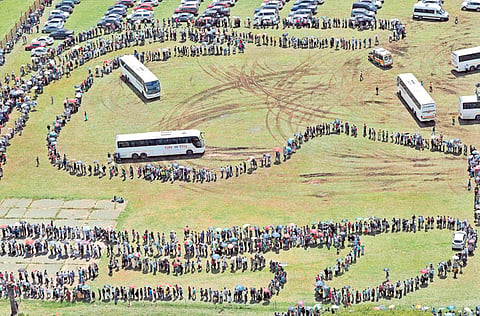Mandela fostered tolerance between country’s different faiths
He was exposed to Islam through anti-apartheid South African Muslim activists

As much as he fought to overcome racial discrimination, former South African president, Nelson Mandela, did much to foster tolerance and harmony between the country’s many different faiths.
Professor Farid Esack is a South African Muslim scholar, writer, and political activist known internationally for his opposition to apartheid and his work for inter-religious dialogue.
Presently the head of the department of religious studies at the University of Johannesburg, he is a man who has been “privileged to spend some private moments with Mandela”.
Esack was appointed by Mandela to South Africa’s gender equity commission, after studying Islam in many countries and building anti-apartheid organisations in the Muslim community in South Africa, which led to him often being detained by the then security police.
Speaking to Gulf News, Esack reflected on how Mandela went out of his way to ensure religious freedom and foster respect and harmony between South Africa’s many faiths.
A Methodist, Mandela tended to keep his religious beliefs to himself. They did not play a central role in his political life although he appreciated the support he got from different religious communities, said Esack.
Mandela was exposed to Islam through the many activists from the South African Muslim community who opposed apartheid since its earliest days. And, on Robben Island where he spent much of his years in prison, there is a Muslim shrine that commemorates Sayed Adurohman Moturu. He was one of Cape Town’s first Imans and was exiled to the island where he died in 1754.
Mandela was well aware of the contribution Muslims and other religious communities in South Africa made to the struggle against apartheid. Many religious minorities have prominent anti-apartheid activists in their communities who regarded as leaders by all South Africans.
For Esack, it is significant that Mandela always insisted that representatives of different religious communities were present on state occasions, including his inauguration as South Africa’s first democratically elected president. At his memorial service on Tuesday, representatives from different faiths again offered prayers.
Even though they often only make up only a small part of South Africa’s population, “Mandela insisted on making space for religious minorities,” said Esack. He recalled an occasion when a family asked the then South African president to insist that a private school allow their daughter to wear a headscarf to class. Respect for the rule of law prevented him from intervening in the case as president. However, in a letter to the parents, a secretary informed them that Mandela wanted them to take the case to court — and he would fund their costs with some of the money he received with the Nobel Peace Prize.
Mandela went out of his way to develop personal relations with the leaders of the religious minorities in South Africa, said Esack. In return, he received the admiration and support of these communities. “The whole of South Africa loves Mandela,” said Esack, “and he has a very special place in the hearts of the Muslim community.” Representatives of the Muslim, Jewish and Hindu communities, among others, have all issued statements paying tribute to Mandela and there have been special services in mosques, temples and synagogues.
Esack points out that while some in these communities have projected their hopes on Mandela, he was part of a huge movement that was committed to the protection of religious minorities. South Africa’s Constitution guarantees religious freedom.
Abdulkader Tayob, professor of Islamic studies and head of religious studies at the University of Cape Town, told agencies: “Mandela acknowledged and recognised their (Muslims’) contribution in the country, their global fears and concerns with the war on terror, and their sense of belonging to South Africa.”
Former South African Muslim Judicial Council leader Sheikh Ebrahim Gabriels said that, before 1994, “Our children were forced to learn the bible at school. After [Mandela] came to power, he told the world that South Africa was a free country of many religions. He also famously [said] that South Africa would not truly be able to enjoy freedom until Palestine was free.”
Esack fondly recalls time he spent with Mandela. “He had an amazing ability, when he was with you, to make you feel that he was totally devoted to you at that moment,” he said.
Remarking on Mandela’s simplicity and humanity, Esack tells how he tried to ensure that the former president leave an evening lecture on time. “When the time came, I tried to make it sound as though he had something important to do. But, he left saying: ‘I’m just an old man that has to go to bed’”.
— Paul Stober is a senior journalist based in South Africa.
Sign up for the Daily Briefing
Get the latest news and updates straight to your inbox



